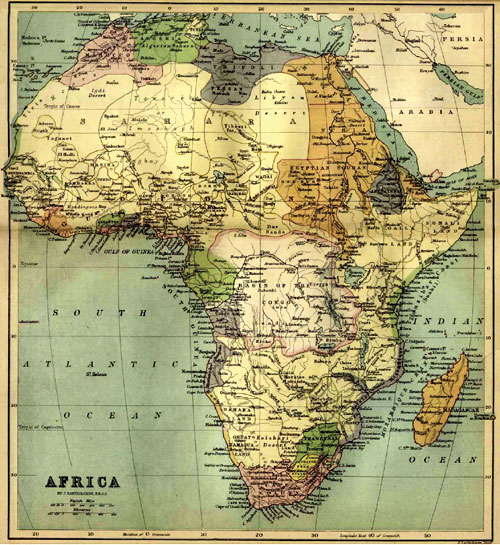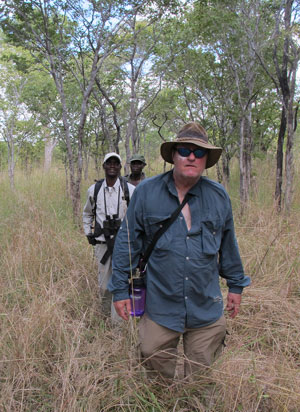    |
|
|||||||||||||||||||
|
 |
|
On February 22, 2012, Anthropologist and modern
day African explorer Julian
Monroe Fisher announced a five year - six expeditions - ethnographic
research project deep in the heart of Africa. Entitled, ‘The
RailRiders Great African Expedition’, Fisher will conduct
a 21st century ethnographic documentation of specific regions of
Africa related to the 19th century Victorian age of exploration.
The project will follow overland the African expeditionary routes
of the famed Victorian explorers to include Speke, Grant, Burton,
Baker, de Brazza, Wissman, Park, Cameron, Stanley and Livingstone.
For the journeys Fisher will implore the use of dugout canoes, Folbot
kayaks, camels, donkeys, horses, feluccas, ferry boats, 4 x 4's
and on foot.
The objective of ‘The RailRiders Great African Expedition’ will be to compare the 19th century ethnographic research documentation of the African tribal kingdoms along the rivers and lakes gathered during the expeditions of the Victorian age explorers with the realities of 21st century Africa. Julian Monroe Fisher is a Fellow of The Royal Geographical Society in London, an International Fellow of The Explorers Club in New York City and a member of The American Anthropological Association. Between 2007 and 2014 Fisher had the honor of carrying the Explorers Club Flag on six research expeditions to the African continent. In 2008 he and his team were accredited by The Ugandan Wildlife Authority for establishing a new route in the Rwenzori Mountains. In 2010 the explorer walked large portions of the African continent between the Indian Ocean coast of Mozambique and the Atlantic Coast of Angola. As part of The RailRiders Great African Expedition Fisher has created The Sir Samuel and Lady Florence Baker Historical Trail. The 360 mile trail stretching from Juba, the capital of the new nation of South Sudan, to Baker's View overlooking Lake Albert in Uganda, was highligthed in National Geographic in July 2013 as one of the top twenty best hiking trails on the planet. |
||||||
|
The Association for Promoting the Discovery of the Interior Parts of Africa (commonly known as the African Association), founded in London on June 9, 1788, was a British club dedicated to the exploration of West Africa, with the mission of discovering the origin and course of the Niger River and the location of Timbuktu, the "lost city" of gold. The formation of this group was effectively the "beginning of the age of African exploration". Organized by a dozen titled members of London’s upper-class establishment and led by the zeal of Sir Joseph Banks, the original aim of the Association was discovery, although halting of the slave trade and commerce later became equally important. Political and religious themes were discouraged. The African Association also felt that it was the great failing of the Age of Enlightenment that, in a time when men could sail around the world, the geography of the Dark Continent remained almost entirely uncharted. The Ancient Greeks and Romans knew more about the interior of Africa than did the English of the 18th century. Motivated by sincere desires for scientific knowledge and the abolition of the slave trade, yet not averse to gaining opportunities for British commerce, the wealthy members each pledged to contribute five guineas per year to recruiting and funding expeditions from England to Africa. Along with British government, the French and Germans later became involved in exploration, but generally with less elevating ideals. In 1830 the Royal Geographic Society (RGS) was founded, a short time later it absorbed the Africa Association. The London Missionary Society's star was rising also, desiring to 'bring god to the heathen' and were actively sending missionaries to Africa and elsewhere. Those missionaries that did arrive in Africa, some found exploring either a natural adjunct to their mission or an accidental by product of their search for converts. Livingstone, Krapt and Rebmann, to name but three. During the Victorian age of exploration from 1844-88 the likes of John Hanning Speke, James Augustus Grant, Richard Francis Burton, Oscar Baumann, Oskar Lenz, Karl Peters, Pierre Savorgnan de Brazza, Hermann von Wissmann, Verney Lovett Cameron, John Rowlands (aka Sir Henry Morton Stanley), Dr. David Livingstone, Sir Samuel White Baker and his wife Florence crisscrossed the African continent in an age unparrelled in geographic exploration. What followed their collectiive expeditions became known as the Scramble for Africa, also known as the Race for Africa or Partition of Africa. Because of these great explorers and what followed forever changed the great African kingdoms and the peoples of the continent. |
|||||||||||||||
|
SOURCES: http://en.wikipedia.org/wiki/African_Association http://unimaps.com/cafrica-explored/index.html |
||||||||||||||
Julian M. Fisher is a Fellow
with The Royal Geographical
Society (with IBG), a Fellow with The
Explorers Club and a Member of the American Anthropological Association |





















